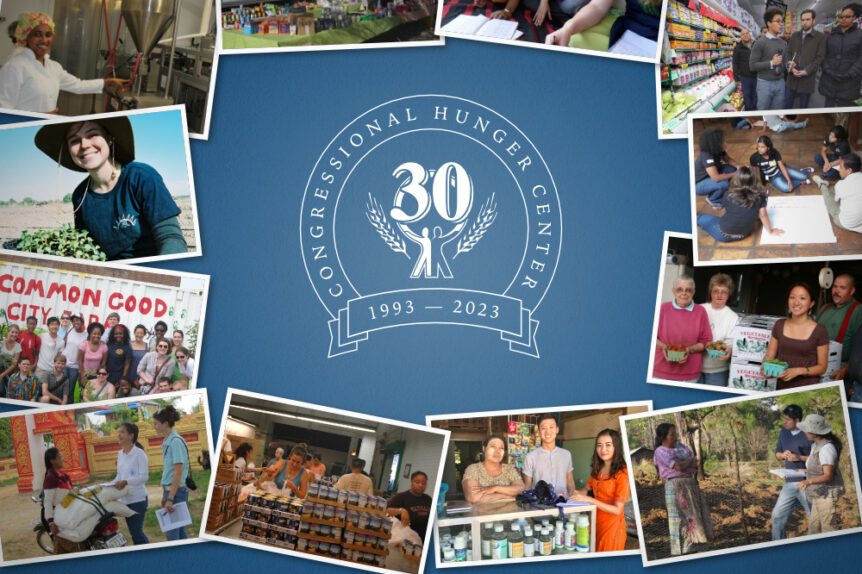
Shannon Maynard as a Hunger Fellow in 1998
I’ve written before about how my experience as a Hunger Fellow in 1997-1998 changed the course of my life forever. What you may not know is that I was here at the Congressional Hunger Center at the very beginning — as a college intern — before the first class of Hunger Fellows was even selected. I’m not alone in recognizing that there is something special about this organization that keeps people coming back: in my case as a Hunger Fellow working in Grand Forks, North Dakota; as part of an advisory board for the fellowship; as a fellow supervisor; and now, since 2015, as executive director.
In those early days, Hunger Fellows (there was only one fellowship then) submitted their application forms on paper; there was no line to include your email address. Long before the age of Snapchat and BeReal, fellows kept in touch with their cohort by writing in a diary that they would mail back and forth, crisscrossing the country again and again until the fellows reunited at the Penn House on East Capitol Street here in Washington, D.C.
Much has changed since those early days, but the important things haven’t: our mission, then as now, is to train, inspire, and connect leaders in the movement to end hunger, and to advocate on behalf of effective and equitable anti-hunger policy.
Over 30 years, we’ve selected and trained 45 cohorts of leaders who have supported the work of hundreds of organizations at the community, state, federal, and international level, allowing these partners to go beyond business as usual and get to heart of the problem. It’s sometimes easy to forget, but concepts like “client choice” in the U.S. and “localization” in global development were once novel perspectives. In 1993, food stamps were paper coupons and only a handful of advocacy organizations focused full-time on hunger. From supporting the state-by-state rollout of EBT, to bolstering the importance of advocacy at the community level, to applying a racial equity lens and a focus on root causes to their work, Hunger Fellows have so often worked at the forefront of change.
Through our leadership development programs, hundreds of bright young leaders have found their purpose, and how they can be most effective at ending hunger and poverty. Over the course of 2023, you’ll read about some of our alums who have gone on to have a powerful impact, bringing the lessons and experience they gained as fellows to advocacy organizations, food banks, local and federal government agencies, NGOs, corporations, higher education, and more. And this summer, we’ll convene our first cohort of Hunger Center Legacy Leaders, a mid-career extension program for our alums to refresh and expand on their leadership skills.
From the beginning, we’ve recognized that hunger is too great a problem to be solved by one organization, one sector, or one political party working alone. We’ve been guided by our bipartisan Congressional heritage, exemplified by the strong bonds of collaboration and friendship of our leading lights, Rep. Mickey Leland and Rep. Bill Emerson. At this year’s Hunger Leadership Awards, we will recognize anti-hunger champions in Congress, the private sector, community-led organizations, and others, including an inaugural award for young alums.
The kernel of all our work has been building the public and political will to end hunger once and for all. Last month, more than 500 people took our online learning challenge for the Martin Luther King Jr. Day of Service, gaining essential knowledge about hunger in the U.S. and how they can advocate for a hunger-free future for their communities. This year, we’re also launching a series of online briefings, showcasing the expertise and experiences of our alums to a wider audience.
I wish I could say that three decades of work was enough to end hunger in the U.S. and around the world. Instead, we mark our anniversary while watching conflict, climate change, a pandemic, and systemic racism erode many of the gains we’ve made. It’s easy to feel powerless, to want to turn away or give in to cynicism. But the idealistic Hunger Fellow that still lives inside me knows that each of us has power to make change, and that by engaging more deeply with our partners and our work, and letting ourselves be guided by hope, we can truly reach our shared vision of a hunger-free world in our lifetime.
That’s why I hope you’ll join us as we celebrate the Hunger Center’s 30th anniversary this year.
- Mark your calendar for 2023 Hunger Leadership Awards on June 21, 2023.
- Join us tomorrow to hear about the groundbreaking work of our Emerson Fellows in communities across the country, and next week at our alum panel discussion on child nutrition and advocacy.
- Host a 30 for 30 Fundraiser to support the Hunger Center and spread awareness and knowledge about the state of hunger in your community. Or make a $30.00 donation in honor of an inspiring leader in your life.
Whoever you are, and however you choose to get involved, we need you in this moment. Today’s interns and fellows are tomorrow’s executive leaders — I’m living proof. By growing leaders and cultivating change, I truly believe we will arrive at a food secure future for all. Won’t you join us?

